Related Research Articles
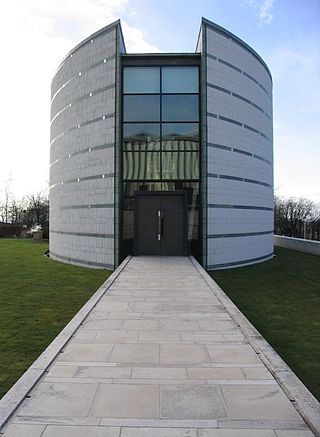
The Ruskin - Library, Museum and Research Centre is an archive, Accredited Museum, and research centre at University of Lancaster, in the north of England. The Director of The Ruskin is Professor Sandra Kemp. Prior to 2019, The Ruskin - Library, Museum and Research Centre was known as the Ruskin Library.

The National Library of Australia (NLA), formerly the Commonwealth National Library and Commonwealth Parliament Library, is the largest reference library in Australia, responsible under the terms of the National Library Act 1960 for "maintaining and developing a national collection of library material, including a comprehensive collection of library material relating to Australia and the Australian people", thus functioning as a national library. It is located in Parkes, Canberra, ACT.
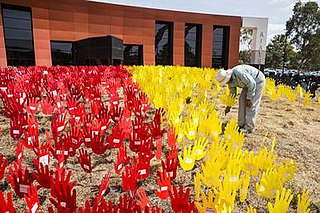
The Australian Institute of Aboriginal and Torres Strait Islander Studies (AIATSIS), established as the Australian Institute of Aboriginal Studies (AIAS) in 1964, is an independent Australian Government statutory authority. It is a collecting, publishing, and research institute and is considered to be Australia's premier resource for information about the cultures and societies of Aboriginal and Torres Strait Islander peoples.
The Irish Film Archive is part of the Irish Film Institute the body charged with the promotion and preservation of film culture in Ireland.

Richard Ovenden is a British librarian and author. He currently serves as the 25th Bodley's Librarian in the University of Oxford, having been appointed in 2014. Ovenden also serves as the Director of the Bodleian Library's Centre for the Study of the Book and holds a Professorial Fellowship at Balliol College. Ovenden is a trustee of the Chawton House Library and vice-chair of the Kraszna-Krausz Foundation. In 2009, he was elected third chair of the Digital Preservation Coalition, succeeding Ronald Milne and Dame Lynne Brindley in a post he held until 2013. and returning in 2015 to the honorary position of President of the DPC. He was elected to the American Philosophical Society in 2015. He is a Fellow of the Society of Antiquaries of London, having been elected in 2008.
The Humanities Advanced Technology and Information Institute (HATII) was a research and teaching institute at the University of Glasgow in Scotland. It was established in 1997 with Professor Seamus Ross as Founding Director until 2009. HATII led research in archival and library science and in information/knowledge management. Research strengths were in the areas of humanities computing, digitisation, digital curation and preservation, and archives and records management.
The Digital Curation Centre (DCC) was established to help solve the extensive challenges of digital preservation and digital curation and to lead research, development, advice, and support services for higher education institutions in the United Kingdom.
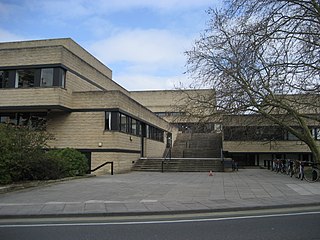
The Bodleian Law Library (BLL) is an academic library in Oxford, England. It is part of Oxford University, the Bodleian Libraries and is also the library of the Faculty of Law. It is situated in part of the Grade II*-listed St Cross Building on St Cross Road in the parish of Holywell, on the corner of Manor Road.

AIM25 is a non-profit making collaborative archive project; a single point of networked access to collection level descriptions of the archives of over one hundred higher education institutions, learned societies and specialist archives within the M25 Greater London area of the United Kingdom. The principal interface for the AIM25 project is the website AIM25.com. It holds over 7500 collection level descriptions on subjects including social sciences, politics, social and economic history, women's history and military history. Each description on AIM25 provides a link to ARCHON which gives contact details of the repository holding that archive.

Europeana is a web portal created by the European Union containing digitised cultural heritage collections of more than 3,000 institutions across Europe. It includes records of over 50 million cultural and scientific artefacts, brought together on a single platform and presented in a variety of ways relevant to modern users. The prototype for Europeana was the European Digital Library Network (EDLnet), launched in 2008.
Reginald Philip Carr is an English librarian, who was Bodley's Librarian from 1997 until his retirement in 2006. He is a member of the Christadelphian church.
The JISC Digitisation Programme was a series of projects to digitise the cultural heritage and scholarly materials in universities, libraries, museums, archives, and other cultural memory organizations in the United Kingdom, from 2004 to 2010 The program was managed by the UK's Joint Information Systems Committee, the body that supports United Kingdom post-16 and higher education and research in support of learning, teaching, research and administration in the context of ICT.
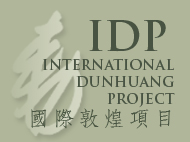
The International Dunhuang Project (IDP) is an international collaborative effort to conserve, catalogue and digitise manuscripts, printed texts, paintings, textiles and artefacts from the Mogao caves at the Western Chinese city of Dunhuang and various other archaeological sites at the eastern end of the Silk Road. The project was established by the British Library in 1994, and now includes twenty-two institutions in twelve countries. As of 18 February 2021 the online IDP database comprised 143,290 catalogue entries and 538,821 images. Most of the manuscripts in the IDP database are texts written in Chinese, but more than fifteen different scripts and languages are represented, including Brahmi, Kharosthi, Khotanese, Sanskrit, Tangut, Tibetan, Tocharian and Old Uyghur.
EUscreen is a website that provides free access to Europe's television heritage through videos, articles, images and audio from European audiovisual archives and broadcasters. Its digitised content covers a period from early 1900 until today. EUscreen "aligns the heterogeneous collections held throughout Europe and encourages the exploration of Europe's cultural and television history by different user groups". EUscreen is also the name of the overarching network of institutions working on providing access European audiovisual collections.

The Medical Heritage Library (MHL) is a digital curation collaborative among several medical libraries which promotes free and open access to quality historical resources in medicine. The MHL is currently digitizing books and journals and is working to expand to the digitization of archival materials and still images. In 2010, the MHL began digitizing titles, mainly monographs, in a variety of medical history and related fields including chemistry, nursing, dentistry, audiology, physiology, psychology, psychiatry, biological science, hydrotherapy, weather, veterinary medicine, gardening, physical culture, and alternative medicine chosen for their scholarly, educational, and research value. Since the inception of the project, materials in audio and video formats have been added to the collection.

Kresen Kernow in Redruth, United Kingdom is Cornwall's archive centre, home to the world's biggest collection of archive and library material related to Cornwall. Funded by the National Lottery Heritage Fund and Cornwall Council and opened in 2019, it brings together the collections which were previously held at Cornwall Record Office, the Cornish Studies Library and Cornwall and Scilly Historic Environment Record as well as in various outstores.
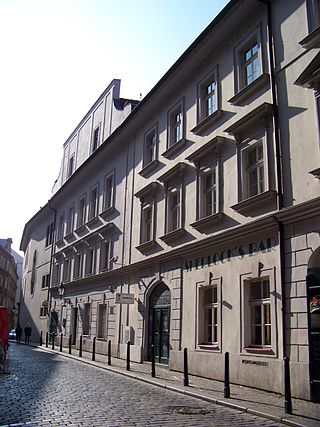
The National Film Archive is a film archive located in Prague, Czech Republic. It was established in 1943 and in 1946 it became a member of the International Federation of Film Archives. In 1997 it became a founding member of the Association of European Film Archives and Cinematheques, ACE.
The Arcadia Fund is a UK charity organization founded by Lisbet Rausing and Peter Baldwin. Established in 2001, the organisation provides grants on a worldwide basis focusing on numerous projects outside the UK. The primary focus of the organisation is to preserve endangered culture and nature and to provide open access. The organisation believes that "once memories, knowledge, skills, variety, and intricacy disappear – once the old complexities are lost – they are hard to replicate or replace" and consequently want to "build a vibrant, resilient, green future".

The Endangered Archives Programme (EAP) is a funding programme and digital archive run by the British Library in London. It has the purpose of preserving cultural heritage where resources may be limited. Each year EAP awards grants to researchers to identify and preserve culturally important archives by digitising them in situ. The original archival material does not leave the country of origin, and projects often incorporate local training and career development. EAP focuses on material created before the mid twentieth century.
Unlocking Film Heritage (UFH) was one of the biggest film digitisation projects ever undertaken and it encompassed the BFI National Archive together with national and regional audiovisual archival institutions in United Kingdom. Between 2013–2017 around 10,000 titles, capturing 120 years of Great Britain on film, were digitised and made free-to-access in a variety of ways. Many archival clips can be watched for free online via BFI Player.
References
- ↑ "Mr Ronald Robert Milne FRSE – The Royal Society of Edinburgh". The Royal Society of Edinburgh. Retrieved 8 December 2017.
- ↑ "Profile: Ronald Milne". Serials: The Journal for the Serials Community. 18: 73–74. 2005. doi: 10.1629/1873 .
- 1 2 "Annual Report 2006/2007". British Library . Retrieved 30 December 2009.
- ↑ Heritage Services at the Ministry for Culture and Heritage, New Zealand. Retrieved 1 January 2012.
- ↑ Yale-NUS Newsroom: 16 December 2016. Retrieved 30 December 2016.
- ↑ "RSLP : About Us". Archived from the original on 21 September 2011. Retrieved 1 April 2011.
- ↑ Milne, Ronald (2001). "Keys to serendipity?: the Research Support Libraries Programme and improving access". Serials. 14: 11–16. doi: 10.1629/1411 .
- ↑ Milne, Ronald (March–April 2002). "The 'Distributed National Collection' Access, and Cross-sectoral Collaboration: the Research Support Libraries Programme". Ariadne (31).
- ↑ John Rylands University Library Annual Report, 1999/2000; pp.11–13
- ↑ Milne, Ronald (2006). "The Google Mass Digitisation Project at Oxford". LIBER Quarterly. 16 (3–4): 265–270. doi: 10.18352/lq.7853 .
- ↑ Grande, James (2006). "National Book Reserve 'Unsuitable' For Oxford". Library Times International. 22: 34–35.